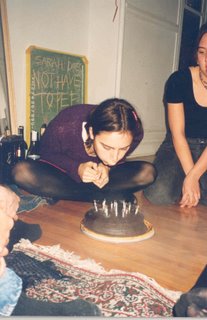Criticism
 By Anne Chudobiak
By Anne ChudobiakWhen I was nineteen, I took an entire class on Alice Munro, but I can’t remember what, if anything, I learned about her. I’d already read all of her stories, but criticism--that was new to me. I spent a lot of time in the library reading Robert Thacker, who had cornered the market on Munro and would eventually write a biography. I couldn’t understand basing your life’s work on someone else’s, especially someone living. It creeped me out.
The professor was another mystery. Robert Lecker (Dr. Delicious?) is known for two main interests and that fall, the year of the second referendum, politics trumped literature. There was talk of McGill relocating to some empty space somewhere in Ontario.
Lecker shocked me by taking offence to a paper I wrote on the story “A Queer Streak.” He said no way would Munro know the word “queer” in the sense of “homosexual.” The rest of the semester was difficult; I didn’t know yet that an expert could be wrong.
The other students were English majors. They read differently. Munro wasn’t self-help to be revisited with each new stage in life: Okay, got the boyfriend. How will he disappoint? They read for technique and structure, not fate. During an off-topic discussion, one of them
inadvertently cracked a code--an acronym? Something to do with the initials of all the main characters--in Atwood's Robber Bride. Lecker advised her to submit her analysis to a literary journal right away. I was so excited that I forgot what it was I was supposed to be excited about.
I resolved to never take another English class again. There were easier ways to learn. That’s why I’m such a sucker for the Dropped Threads essays. No middle man. Not even the guise of fiction. Life writing.
I recently paid 24.95 for the third edition (Dropped Threads 3: Beyond the Small Circle). And you know why. She of The Robber Bride. Atwood's essay “Polonia: In response to “What advice would you give the young?” opens the book. It is, of course, very funny, particularly the part about dryer lint, but it’s not even seven pages long, shorter, if you, like me, skim over the Shakespeare quote. Shameless.
I finished it quickly and moved onto the next piece, which reminded me of something. What was it? Oh, yeah. This blog. Either Dropped Threads isn’t worth the list price or we need to start charging. Listen up, all you nineteen-year-olds.
p.s. “Love and Fear,” by Bernice Morgan (p. 219, Dropped Threads) is even funnier than dryer lint.
p.p.s. “About the Boys,” by Liane Faulder (p. 187) made me cry.
p.p.p.s. Judy Rebick’s “Rebellion and Beyond” (page 125) was the most enlightening. I won’t say why. It’s personal.
5 Comments:
Gosh, Anne I was flipping through a Dropped Threads edition at the grocery story just yesterday - sadly, I still haven't read any of it. I must get it now. You say the others were English majors, I'm curious, what was your major?
How concidental. I just finished reading Dropped Threads but it must have been a different edition. The one I read is subtitled "What We Aren't Told" and was edited by Carol Shields and Marjorie Anderson. I just loved it. Must look for the other editions. Also, I'm an Alice Munro groupie, but I don't remember her writing Robber Bride. I thought that was Atwood, but then I'm often confused.
Great post, Anne.
There are three anthologies: What we aren't told, More of what we aren't told and Beyond the small circle.
The Robber Bride was obviously not on our Munro curriculum! What I wouldn't do for an in-house editor...I'll see if I can't make that clearer.
Anna, It's funny you should ask what my major was. Whenever I meet someone who had the same major (Humanistic Studies), we look at one another as though we've just revealed a little too much about ourselves. The only gathering of our kind that I ever attended took place at a frat house (unusual for McGill) for aspiring poets. "This is where we write our poems, here's where we play foosball."
I love the "Dropped Threads" books. Each essay is like a quiet conversation with someone who actually understands the question.
Oh thank you so much for this post, I am so in love with this journal, this is amazing, life essays, oh...yes!!! do you read The Sun? I love it as well, alllll non fiction, allll wonderful, I have to get this, thank you, I haven't heard of it before..xoxo
Post a Comment
<< Home